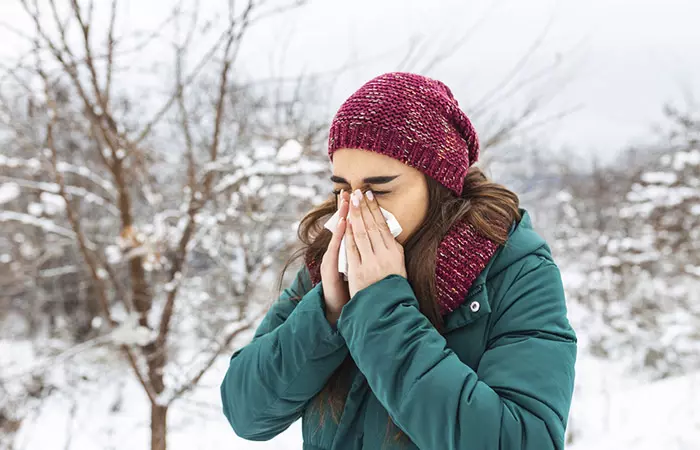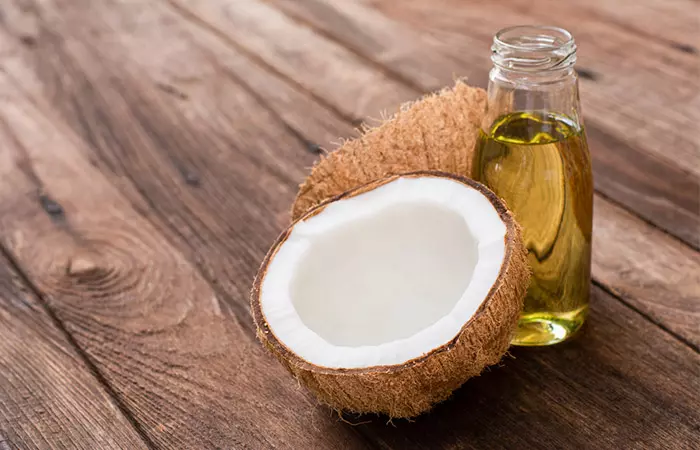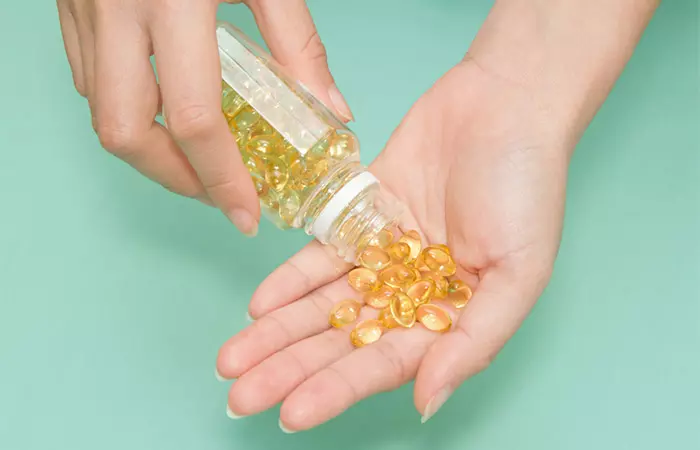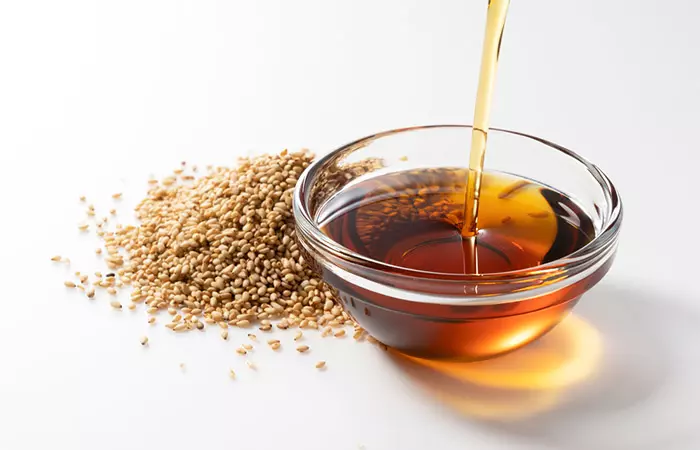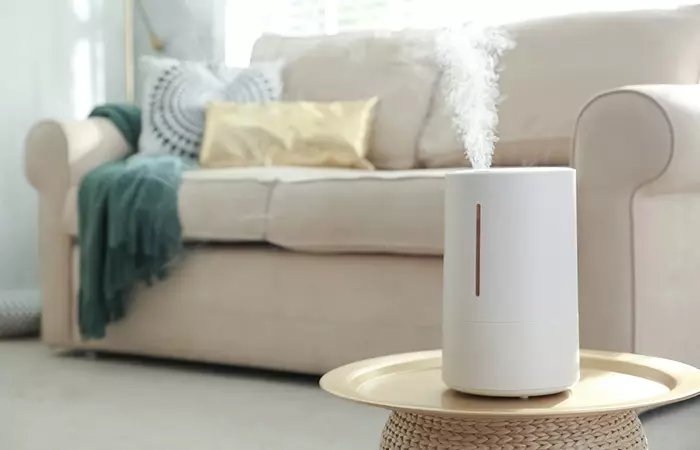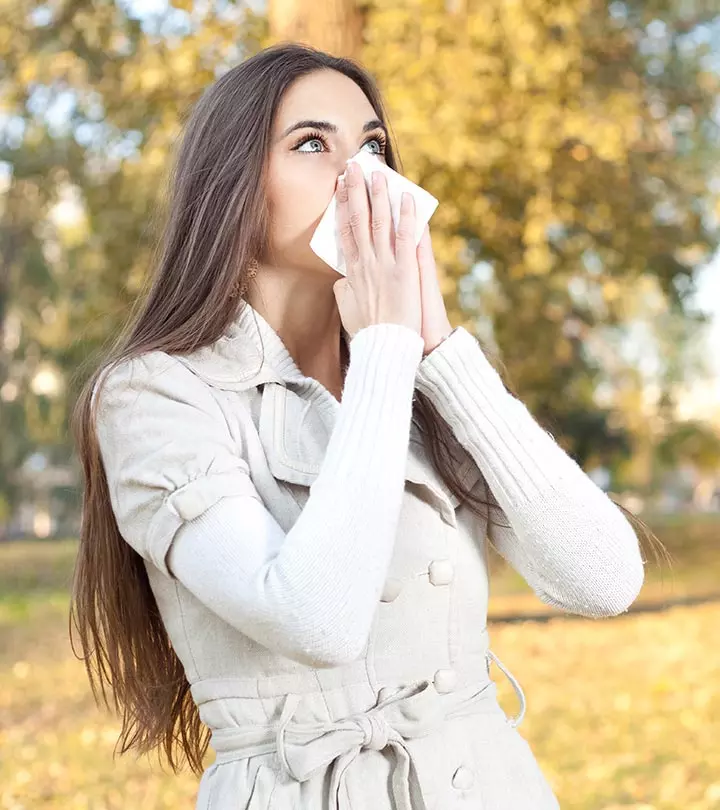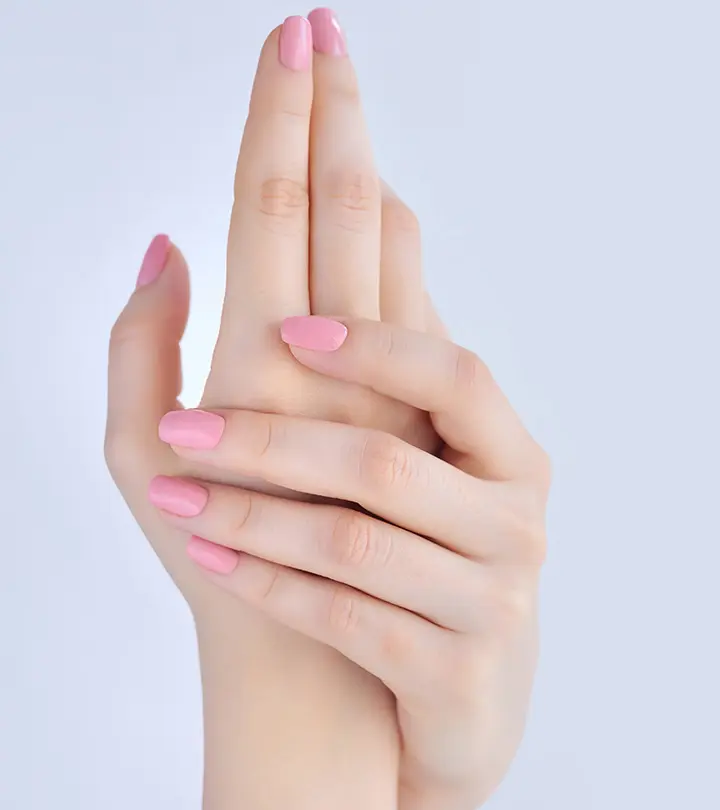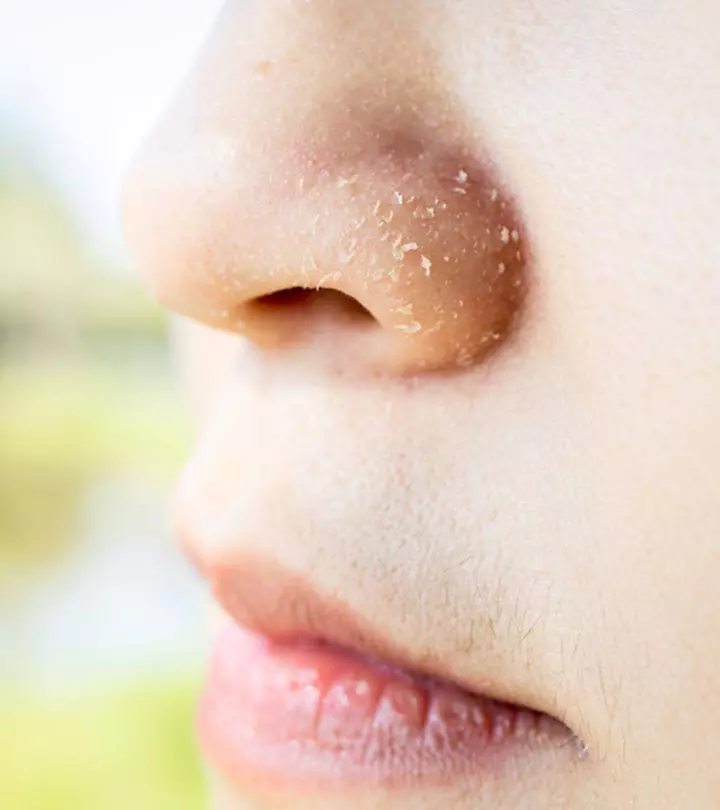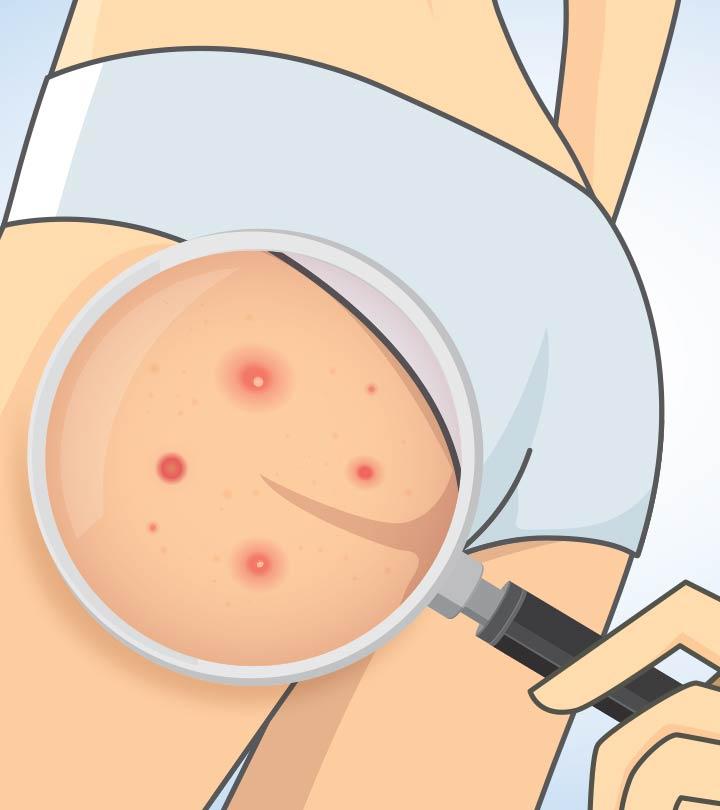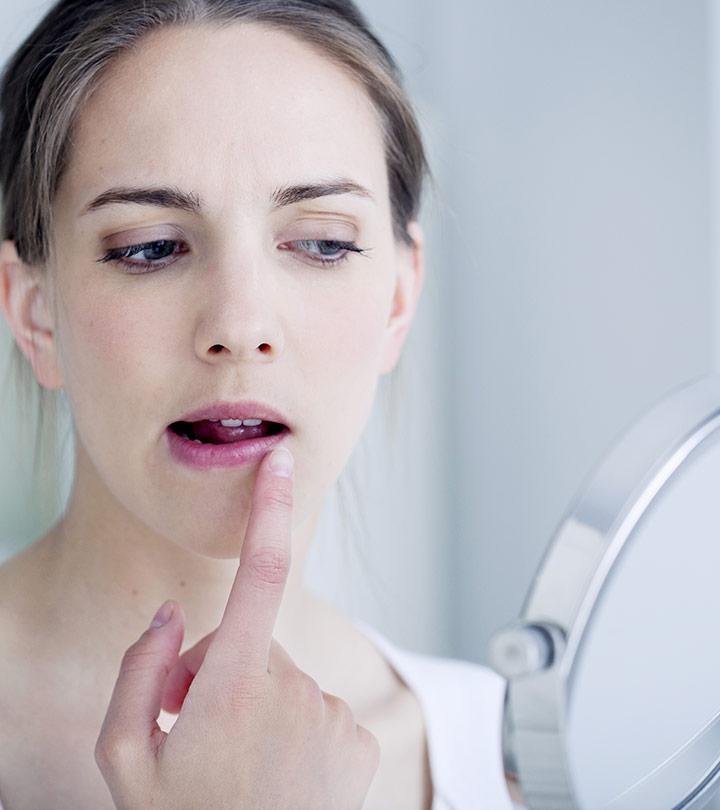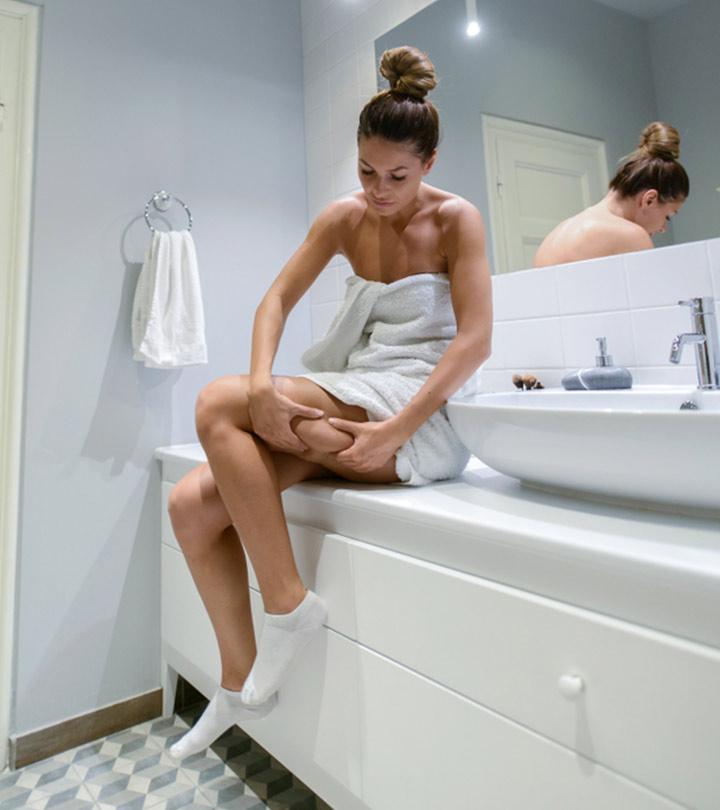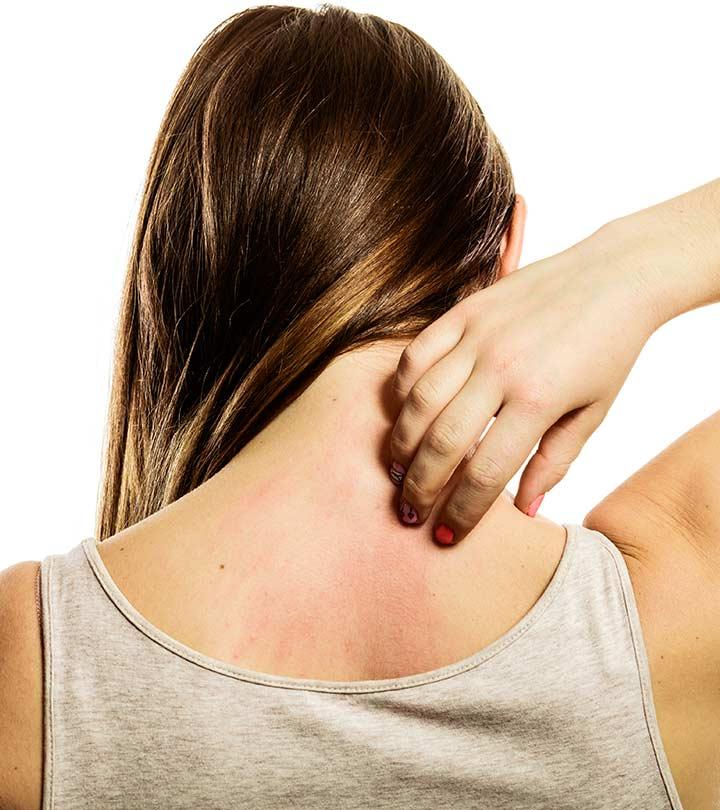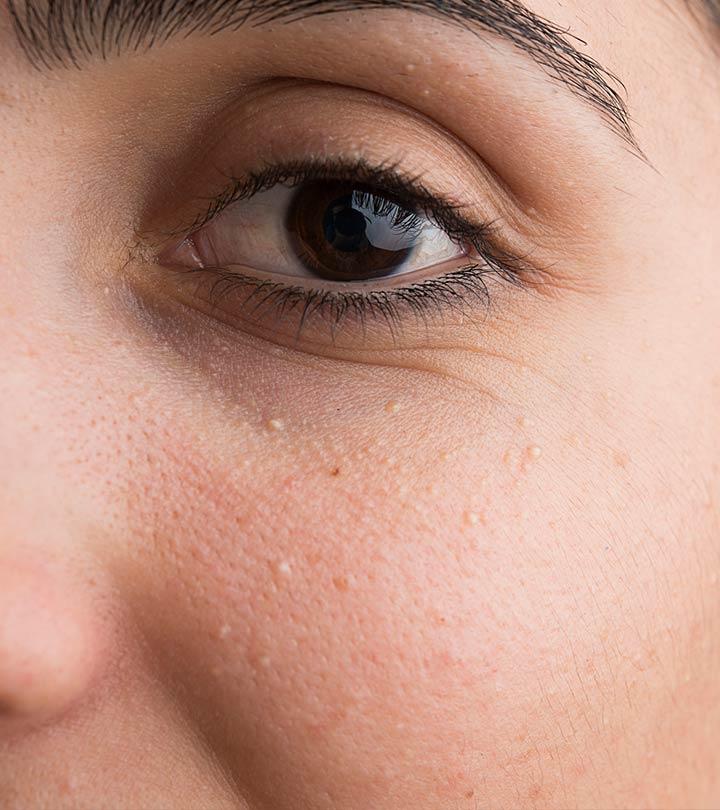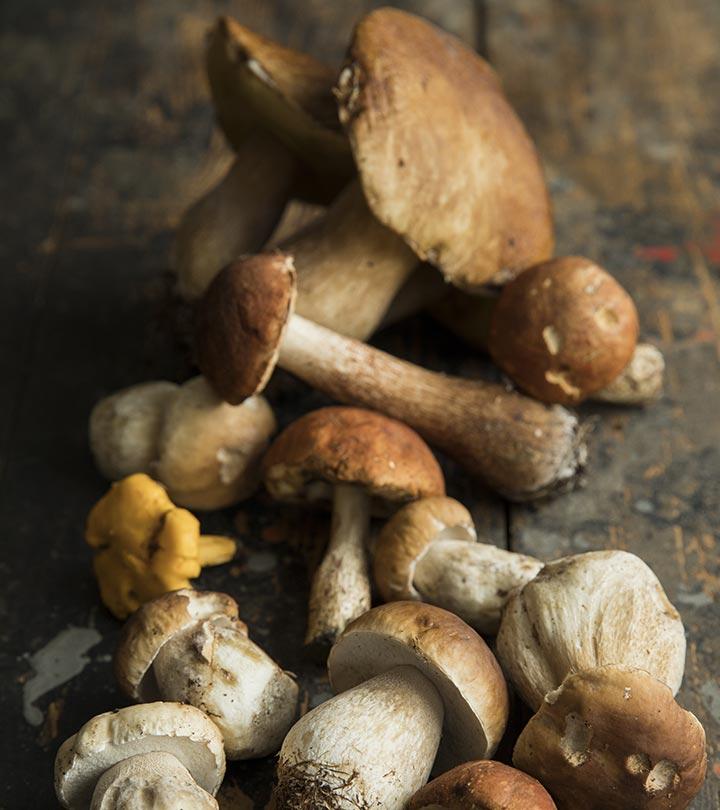9 Effective Home Remedies To Treat A Dry Nose
Easy solutions for a problem that is quite commonplace, especially in cooler climates.

Image: Shutterstock
Seasonal changes, allergies, dehydration, and other environmental stressors may sometimes lead to a dry nose. While this is nothing to worry about, certain natural remedies can help treat dry nose at home.
Your nose not only helps you breathe and smell but also helps keep the dust, dirt, and allergic pollens from entering your system. But a dry nose may cause difficulty in vision and trouble breathing. Along with the skin, your nose is among the body’s first lines of defense. Hence, it is important to keep it functioning well. The following remedies can help relieve dry nose. Check them out.
In This Article
What Is A Dry Nose?
A dry nose occurs when the internal nasal passages dry out. This can also cause crusting of the inner nose mucosa (1). A crusty nose can cause discomfort and pain.
Here are the most effective home remedies for dry nose you can try to get relief from the condition.
Dry Nose Home Remedies
1. Coconut Oil
Using natural oils is a good dry nose remedy. Coconut oil can help moisturize the skin and fill the gaps between the dry cells (2). Applying it to the nostrils can help prevent dryness and reduce pain. Make sure not to overdo this remedy.
You Will Need
What You Have To Do
Pour a drop or two of coconut oil in each nostril.
How Often You Should Do This
Do this once a day.
2. Saline Spray
Saline or saltwater is a simple home remedy for a dry nose, and it can be easily prepared at home. The salt water acts as a humidifier and keeps the nasal lining hydrated. It helps in clearing out mucus and irritants in the nasal passage (3).
Caution: Do not use table salt as it may contain other additives that can irritate the nasal mucosa further.
You Will Need
- 1 teaspoon pure salt or sea salt
- 1/2 cup water
- Spray bottle
What You Have To Do
- Mix the salt with the water and pour this into the spray bottle.
- Bend your head towards the floor and spritz the salt water a few times into the nasal cavities.
- You can also take some of the saline water in your palm and inhale it so that it reaches as far as possible in the sinus cavities. Blow it out after 10 seconds.
- You can also purchase empty nasal spray bottles. Most drugstores sell saline nasal sprays over the counter.
How Often You Should Do This
Use the saline spray 3-4 times a day.
3. Vitamin E Oil
Vitamin E oil is a good dry nostril remedy as it helps increase the hydration of the skin and has antioxidant and anti-inflammatory properties (4), (5). A study shows that alpha-tocopherol (a type of vitamin E) could help in the treatment of pollen-induced allergic rhinitis (6). Hence, it may hydrate the nasal mucosa, relieve dryness, and accelerate the healing process of the nasal passages.
You Will Need
Vitamin E capsules
What You Have To Do
- Pierce the vitamin E capsule.
- Tilt your head upwards and pour two to three drops of the oil into the nostrils.
How Often You Should Do This
Do this 2 times a day.
4. Olive Oil
Olive oil, like coconut oil, hydrates the skin inside the nasal passages, thus alleviating the dryness (7). It also relieves irritation and swelling (8).
You Will Need
- Virgin olive oil
- Dropper
What You Have To Do
Using the dropper, pour a few drops of olive oil into the nostrils.
How Often You Should Do This
Repeat this 2 times daily.
5. Sesame Oil
The vitamin E content of sesame oil is higher than that of most other oils. It is a great moisturizer for dry skin. In a study, sesame oil was proven to work better than the saline irrigation method to relieve nasal dryness (9).
You Will Need
- Organic sesame oil
- Dropper
What You Have To Do
- Tilt your head backward and pour a drop of sesame oil in each nostril.
- Inhale deeply so that the oil reaches the internal nasal passages.
How Often You Should Do This
Do this 2 times a day.
6. Steam
The easiest way to get rid of a dry nose is to inhale steam at regular intervals. This soothing remedy softens the dried mucus in the nasal passages (10).
You Will Need
- Hot water
- A large bowl/basin
- A big towel
What You Have To Do
- Pour the hot water in the bowl.
- Cover your head with the towel and inhale the steam from the bowl for about 10 minutes.
- Blow your nose gently after this.
How Often You Should Do This
Inhale steam 2-4 times a day.
 Quick Tip
Quick Tip7. Humidifier
Dryness in the environment can worsen a dry nose and trigger congestion. Maintaining humidity in the room where you spend most of the day is a necessity in frigid weather conditions. Low humidity, cold weather, and seasonal change can cause nasal congestion, runny nose, and breathing difficulty.
Humidifiers or vaporizers are one of the best home remedies for dry noses and are used to add moisture to the surroundings and can ease symptoms, such as irritation in the nose and dryness (11). In the absence of humidifiers, water-filled buckets can be placed near heating systems to create ambient humidity.
 Quick Tip
Quick Tip8. Sauna
Who doesn’t love a sauna bath? It is one of the best ways to treat dry nose and sore muscles. If you don’t prefer a sauna bath, simply heat a bath, add a few drops of aroma oil to it, and soak in its goodness for a few minutes. Do not stay in long unless you wish to get a leaky nose in exchange for a dry one.
Warning
One remedy that people often tend to resort to for obtaining relief from a dry nose is using petroleum jelly. However, this remedy is not recommended by doctors. The internal application of petroleum jelly has been linked to a type of pneumonia (12). Hence, steer clear of this home remedy.
9. Neti Pot
Using a saline solution with neti pot helps cleanse the nasal cavity and remove inflammation-causing substances from the nostrils (13).
You Will Need
- Neti pot
- 1 cup of lukewarm water
- 1 teaspoon of non-iodized salt
- A clean towel
What You Have To Do
- Mix the non-iodized salt in lukewarm water to prepare the saline solution.
- Add this solution to a clean, dry neti pot.
- Stand over a sink with your head tilted sideward at a 45-degree angle.
- Place the neti pot’s spout into your upper nostril while breathing through your mouth.
- Slowly pour the saline solution into the upper nostril so that it can drain from the lower nostril.
- Remove the neti pot and bring your head up.
- Breathe through both nostrils to clear out your nose.
- Repeat the same process for the other nostril.
How Often You Should Do This
Once a day
Infographic: Essential Oils You Can Add To Your Humidifier To Relieve A Dry Nose
A dry nose may be caused by a number of factors, including a bacterial or viral infection, sinusitis, or dry environment. It usually accompanies symptoms such as congestion, inflammation, and headaches. Using a humidifier is one of the simplest ways to relieve the dryness in your nose and add moisture back to it. You can add some essential oils to your humidifier for a boost of benefits. Check out the infographic below to know which essential oils are the most suitable for relieving a dry nose. Illustration: StyleCraze Design Team
Drying out of the internal nasal passages may lead to a dry nose. Seasonal changes, dehydration, and other environmental stressors may also contribute to the condition. If you are on strong medications for any ailment, nasal dryness can also be due to medication side effects. A dry nose may cause difficulty in vision and trouble breathing. Use the home remedies mentioned above with a high-protein diet to help battle the infection and tackle a dry nose. If you experience any side effects, discontinue using the remedies immediately. Consult your doctor right away if the condition worsens to the point of bleeding and breathing difficulties.
Frequently Asked Questions
What causes a dry nose?
The common causes of a dry nose range from air conditioning and dehydration to the side effects of medications, such as decongestants and antihistamines.
Is a dry nose a serious symptom?
A dry nose results in nasal irritation, itching, swelling, wheezing, and nosebleeds. When this dryness lasts for more than 10 days, you should consult your doctor as it may indicate serious underlying conditions, such as Sjogren’s syndrome. Also, if you experience symptoms related to infections, such as high fever, nonstop bleeding, and lethargy, consult your doctor immediately.
What are the potential complications of a dry nose?
The potential complications of a dry nose include dry skin, blurred vision, skin rashes, wheezing, and other breathing problems.
What to eat and avoid to relieve a dry nose?
• Drink enough fluids. The depletion of body fluids makes the body tissues dry. Plenty of water is required to make the nasal tissues work efficiently. Drink a minimum of eight to ten glasses of water per day.
• Having hot and spicy food or liquid items, for example, chicken soup, can moisten the nostrils and give you some relief.
• Reduce your caffeine, alcohol, and salt intake as these are dehydrating agents. If you have a dry nose, avoid consuming these foods.
• Cut down on any medication that increases the dryness after consulting your doctor. Medications tend to dehydrate the body, which often causes dry nasal passages. Keep your body properly hydrated if you need to take a high dose of medicine due to any existing illness.
Can I put Vicks in my nose?
No. The camphor in Vicks may be toxic to the body if absorbed through the mucous membrane, especially among children (14). In addition, petroleum-oil-based products such as Vicks Vapourub may cause exogenous lipoid pneumonia (a type of pneumonia caused by inhalation of fatty substances) (15).
Key Takeaways
- Seasonal changes or dehydration can leave your nose feeling dry and uncomfortable.
- Inhaling steam or using a humidifier are easy ways to treat a dry nose and clear the nasal passage of dried mucus.
- Use a saline spray to keep your nasal passage hydrated and irritation-free.
- Other home remedies include pouring 1-2 drops of a coconut, olive, or sesame oil into each nostril about 2 times a day.
Learn how to prevent and manage a dry nose with simple tips and tricks listed in this video. Get the relief you need and keep your nose healthy. Watch now!
References
Articles on StyleCraze are backed by verified information from peer-reviewed and academic research papers, reputed organizations, research institutions, and medical associations to ensure accuracy and relevance. Read our editorial policy to learn more.
- Rhinitis Sicca, Dry Nose and Atrophic Rhinitis: A Review of the Literature, European Archives of Oto-rhino-laryngology, US National Library of Medicine, National Institutes of Health.
https://pubmed.ncbi.nlm.nih.gov/20878413 - A randomized double-blind controlled trial comparing extra virgin coconut oil with mineral oil as a moisturizer for mild to moderate xerosis, Dermatitis : contact, atopic, occupational, drug, US National Library of Medicine, National Institutes of Health.
https://www.ncbi.nlm.nih.gov/pubmed/15724344 - Saline Nasal Irrigation for Upper Respiratory Conditions, American Academy of Family Physicians, US National Library of Medicine, National Institutes of Health.
https://www.ncbi.nlm.nih.gov/pmc/articles/PMC2778074/ - Influence of vitamin E acetate on stratum corneum hydration, Arzneimittel-Forschung, US National Library of Medicine, National Institutes of Health.
https://www.ncbi.nlm.nih.gov/pubmed/9706379 - Evaluation of the antioxidant capacity and preventive effects of a topical emulsion and its vehicle control on the skin response to UV exposure, Skin Pharmacology and Physiology, US National Library of Medicine, National Institutes of Health.
https://www.ncbi.nlm.nih.gov/pubmed/16145283/ - Alpha-tocopherol acetate nasal spray in the treatment of pollen-induced allergic rhinitis, Allergo Journal International, SpringerLink.
https://link.springer.com/article/10.1007/s40629-018-0086-7 - Effect of olive and sunflower seed oil on the adult skin barrier: implications for neonatal skin care, Pediatric Dermatology, US National Library of Medicine, National Institutes of Health.
https://www.ncbi.nlm.nih.gov/pubmed/22995032 - Molecular mechanisms of inflammation. Anti-inflammatory benefits of virgin olive oil and the phenolic compound oleocanthal, Current Pharmaceutical Design, US National Library of Medicine, National Institutes of Health
https://www.ncbi.nlm.nih.gov/pubmed/21443487 - Pure sesame oil vs isotonic sodium chloride solution as treatment for dry nasal mucosa, Archives of Otolaryngology–Head & Neck Surgery, US National Library of Medicine, National Institutes of Health
https://www.ncbi.nlm.nih.gov/pubmed/11701073 - Treating chronic sinusitis, US National Library of Medicine, National Institutes of Health.
https://www.ncbi.nlm.nih.gov/books/NBK279484/ - Humidifiers and health, MedlinePlus, US National Library of Medicine, National Institutes of Health.
https://medlineplus.gov/ency/article/002104.htm - Not Your Typical Pneumonia: A Case of Exogenous Lipoid Pneumonia, Journal of General Internal Medicine, US National Library of Medicine, National Institutes of Health.
https://www.ncbi.nlm.nih.gov/pmc/articles/PMC2219803/ - Saline Nasal Irrigation for Upper Respiratory Conditions, American Family Physician Jounral.
https://www.aafp.org/pubs/afp/issues/2009/1115/p1117.html - Camphor poisoning: An unusual cause of seizure in children, Journal Of Pediatric Neurosciences, US National Library of Medicine, National Institutes of Health.
https://www.ncbi.nlm.nih.gov/pmc/articles/PMC4395957/ - Exogenous lipid pneumonia related to long-term use of Vicks VapoRub® by an adult patient: a case report, BMC Ear Nose Throat Disord., US National Library of Medicine, National Institutes of Health.
https://www.ncbi.nlm.nih.gov/pmc/articles/PMC4992226/
Read full bio of Dr. Abby Kramer
Read full bio of Ramona Sinha
Read full bio of Monomita Chakraborty





